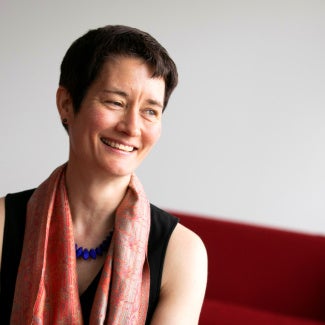AIA/ACSA Topaz Medallion for Architectural Education 2024: Elizabeth Plater-Zyberk, FAIA
Elizabeth Plater-Zyberk, FAIA is the 2024 winner of the AIA/ACSA Topaz Medallion for Architectural Education. Plater-Zyberk has transformed the teaching of architecture by ceaselessly promoting walkable and resilient design, and integrated her students into projects that build community and support well-being.

Elizabeth Plater-Zyberk, FAIA
For Elizabeth Plater-Zyberk, FAIA, practice, teaching, and research have always been intertwined, and her career, which stretches across four decades, has included exemplary contributions to the built environment. As formidable an architect as she is an educator, Plater-Zyberk has transformed the teaching of architecture by ceaselessly promoting walkable and resilient design. She has attracted students from around the world to the University of Miami, where Plater-Zyberk is a distinguished professor of architecture and former dean, integrating them into projects that build community and support well-being.
Plater-Zyberk, who holds degrees from Princeton and Yale universities, has played a significant role in shaping UMiami’s School of Architecture since it was formally created by university President Edward T. Foote II in 1981. Since she began teaching at the university in 1979, Plater-Zyberk has continually sought out problems in the built environment that she could address collaboratively with students and colleagues.
As dean of the school, a position she held for 18 years, she augmented the Bachelor of Architecture degree with two- and three-year master’s degrees in architecture, a post-professional master’s in urban design, and a master’s in real estate development and urbanism. In addition, she raised more than $10 million to support professorships, new programs, and the construction of three new facilities. During her leadership, the school experienced significant institutional growth, and she nurtured a culture of intellectual exchange, encouraging faculty to engage in research and share their work in publications.
“Lizz was clearly a hands-on dean, who seemed to know most students by name, and who worked quietly behind the scenes to create a strong support network for all students,” noted Marleen Kay Davis, FAIA, in a letter nominating Plater-Zyberk for the Topaz Medallion. “A commitment to community/place started before students came to campus: Incoming freshmen were asked to create a black-and-white formatted layout regarding where they grew up for display during the first month of class. This has been a long tradition, helping to create community among the students and sending the message that every background is valued.”
Informed by her experience as a co-founder of the Congress for the New Urbanism, she continues to teach important courses on architecture and urban design, including the recently developed course “Adaption to Climate Change.” Her former students can be found engaged in design initiatives in communities across the globe. In addition, Plater-Zyberk holds a parallel appointment within the university’s Miller School of Medicine and collaborates with faculty peers on research on the built environment’s impact on human health. She continues to lecture widely and is a visiting professor at institutions of higher education in the U.S., Europe, and Asia, presenting more than 100 lectures in the past decade alone.
Outside of the academy, Plater-Zyberk continues to practice at DPZ CoDesign, the Miami-based firm she co-founded in 1980 with Andrés Duany, FAIA. Building on its well-established reputation for innovation and community design, the firm now boasts six partners with offices across the nation. Its work, widely celebrated with awards and honors, has contributed to the discourse on community, town planning, and urban design.
Karen Lu, FAIA, Chair, Snow Kreilich Architects, Minneapolis
Illya Azaroff, FAIA, +LAB architects, New York City
Colt Brock, Assoc. AIA, American Institute of Architecture Students, Atlanta
Elizabeth Danze, FAIA, Danze Blood Architects, Austin, Texas
Bradford C. Grant, Howard University, Washington, D.C.
Presented jointly by AIA and the Association of Collegiate Schools of Architecture (ACSA), this award recognizes outstanding individual contributions in architectural education.
Design solutions affect more than the client and current occupants. Good design positively impacts the future by helping communities thrive—socially, economically, and environmentally.













